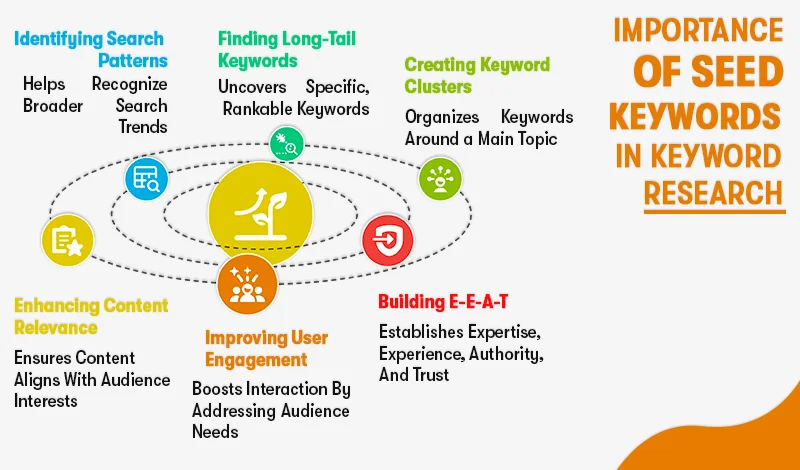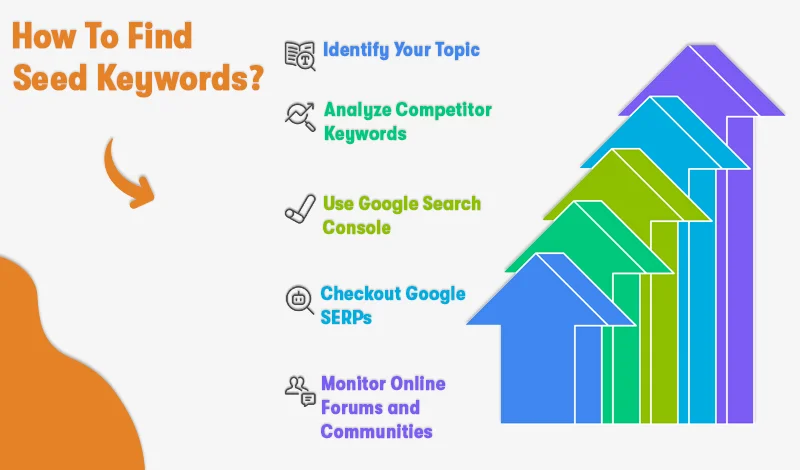When you start writing a blog or researching keywords, you might be using seed keywords without realizing it. These are the basic words or phrases that describe your topic and help guide your content creation.
Identifying the right keywords is a key first step in crafting an effective SEO strategy. This list makes a strong base for deeper keyword research and helps shape the direction of your content.
In this guide, you’ll learn what seed-keywords are and how to begin keyword research effectively. This is a main step toward creating content that ranks high and reaches the right audience.
What are Seed Keywords?
Seed keywords are broad terms, made up of one or two words, that represent the main idea of a topic. They serve as the starting point for keyword research and usually have a high search volume, making them more competitive to rank for. Also known as head terms, it helps you explore related keywords to grow your list.
For Example
A fitness company could start with initial keywords such as training or fitness while a pet supply shop might focus on keywords like cat toys or bird cages.
Importance of Seed Keywords in Keyword Research

Seed-keywords are crucial because they help you find a wide range of related search terms to improve your keyword research.
- They play a key role at the start of keyword research by helping you identify wider search patterns within your niche.
- They are competitive and help you find more specific long-tail keywords seo that are easy to rank and more relevant to your target audience.
- These Keywords help you create keyword clusters around a main topic, supporting better content organization, stronger SEO, and building E-E-A-T (Expertise, Experience, Authority, and Trust) for your website.
- It helps you grow your keyword options and discover related long-tail keywords that really connect with your audience.
- Seed-keywords also help you make content that answers your audience’s questions and interests, improving relevance and user engagement.
- It reveals popular search terms to help you create relevant content.
How To Find Seed Keywords?

Following are the points that help you understand how to identify effective Initial keywords for your content.
1: Identify Your Topic
Start by clearly defining the main subject or niche of your website or business and what your audience wants to learn about. For example, a healthy food blog might focus on topics like meal planning, nutrition tips, and recipes. This approach keeps your start simple, free from competitor or trend confusion.
2: Analyze Competitor Keywords
Analyze the keywords your competitors target to gain valuable insights into successful strategies in your niche. With the help of Ahrefs and SEMrush tools , you can find the keywords your competitors are ranking for.
3: Use Google Search Console
It helps you identify your top-performing search queries. You may discover that your content already ranks for certain keywords, offering opportunities to explore more seed-keywords.
4: Checkout Google SERPs
Google SERPs offer endless keyword ideas but lack key data like search volume and traffic. Luckily, SEO tools fill this gap, many are paid, but the free Keyword Surfer Chrome extension is a great option. Simply install it, search your main topic on Google, and explore related keywords in the sidebar. Arrange keywords based on search volume to easily find the top seed keywords.
5: Monitor Online Forums and Communities
Another way to find initial keywords is by looking at real consumer feedback. Observe the words and questions people share in forums and groups relevant to your niche.
Avoid These Common Mistakes
Avoid these common mistakes and boost your success instantly
- Relying too heavily on broad keywords without considering search intent.
- Overlooking long-tail keywords that can drive more targeted traffic.
- Ignoring competitor analysis for keyword inspiration.
- Ignoring search volume and competition before picking a keyword.
- Not updating your seed keywords regularly to keep up with changing trends.
Conclusion
Seed-keywords might appear minor in your SEO strategy, but they actually form the core foundation of your entire research process. Starting with these keywords, you can expand your list to include long-tail keywords that attract more targeted traffic.
Remember, thorough research and analysis of initial keywords set the tone for your entire SEO strategy. With the right approach, you’ll create content that resonates and ranks well in search engines.


